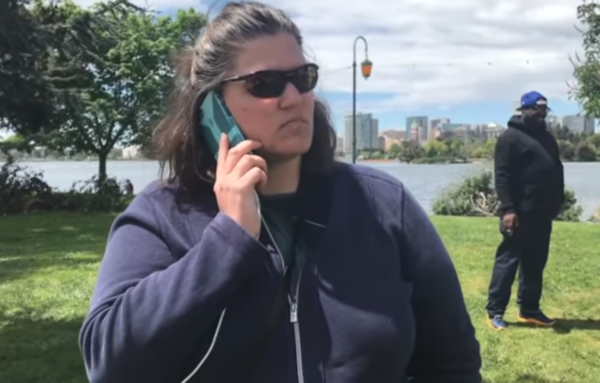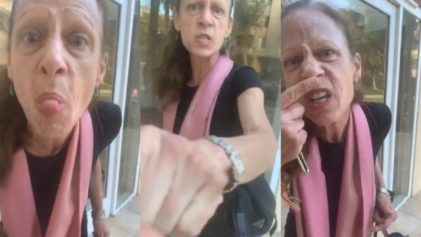A Michigan city is taking steps to criminalize dialing 911 on people of color for simply living their lives.
Leaders in Grand Rapids are set to vote on a proposed “bias crime reporting prohibition” in May that would make it a criminal misdemeanor to racially profile Black people and other minorities by calling the police for frivolous reasons, MLive reported.

Jennifer Schulte, aka “BBQ Becky” went viral after calling the police on a group of African-Americans grilling at a park in Oakland, California. (video screenshot)
The move is among a handful of improvements that would be made to the city code as part of the proposed human rights ordinance, which includes “identifying four primary potential areas of discrimination, codifying the referral and complaint procedures for Grand Rapids Diversity & Inclusion Office and expand protected class definitions,” among other changes.
The “bias crime reporting prohibition” would specifically outlaw profiling Black and brown citizens for “participating in their lives,” and states that, “no person shall make a police report that’s based in whole, or [in] part on an individual’s membership in a protected class rather than on reasonable suspicion of criminal activity in consideration of all available facts and the totality of the circumstances.”
Those found to be in violation of the ordinance would be hit with a $500 fine each day the violation occurs and would face prosecution by the city attorney’s office.
Patti Caudill, Diversity and Inclusion Manager for Grand Rapids, said the ordinance isn’t intended to discourage 911 calls, but rather to force people to “check their biases” before they pick up the phone and dial police.
“Call the police, but if you’re calling because your neighbors are having a barbecue and you’re calling because of some implicit bias because they’re people of color, we don’t want to see that,” Caudill told MLive.
Jeremy DeRoo, executive director for local nonprofit advocacy group LINC Up, echoed Caudill’s concerns and cheered the proposed ordinance, saying the changes could help address racial issues affecting the city.
“We in the community have had various conversations over [the] last few years about the disparities that exist in Grand Rapids,” he said. “The human rights ordinance provides the infrastructure so that all of these issues have a backbone supporting and addressing them.”
More recently, DeRoo said Grand Rapids Police has been unnecessarily called in for situations due to 911 calls placed by people carrying implicit racial biases. He pointed to one instance in 2017 where authorities were called to break up a large gathering of Black locals at Mulick Park, which turned out to be a graduation party.
More frightening was an Oct. 9 incident involving a 12-year-old girl who was handcuffed at gunpoint after a neighbor claimed to have witnessed a shooting at the home. Police found no weapons or shooting victims at the scene, however.
These scenarios aren’t unique to Grand Rapids, however. Black folks across the country have found themselves on the receiving end of harassment by police simply for existing in “white spaces.”
In 2018 alone, African-Americans had the police called on them for enjoying a barbecue in the park, selling bottled water on the sidewalk, snoozing in a common room of a dorm, going to the pool, babysitting two white children, and moving into a New York City apartment, just to name a few.
Earlier this year, Detroit urban farmer Marc Peeples filed a lawsuit against three white women he claims made frivolous charges against him to police for simply “gardening while Black.” The women — Deborah Nash, Martha Callahan and Callahan’s granddaughter Jennifer Morris — even went so far as to accuse Peepl’s of being a convicted child molester, which led to his arrest.
They just want to control any and everything they see,” Peeples told WXYX Detroit at the time, recalling the racist harassment. “They don’t want to see a young black man coming up and doing something positive.”
Grand Rapids leaders are expected to vote on the proposed ordinance next month but must wait until city stakeholders have a chance to discuss the matter during a public hearing scheduled for April 23.


